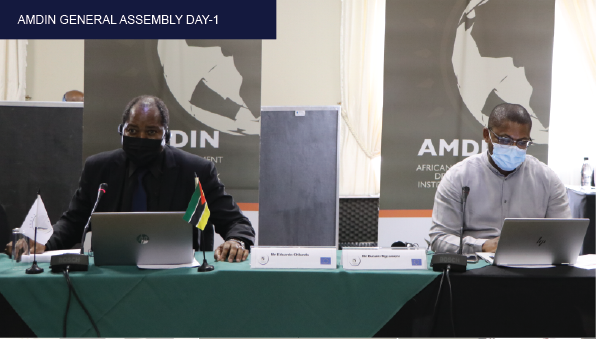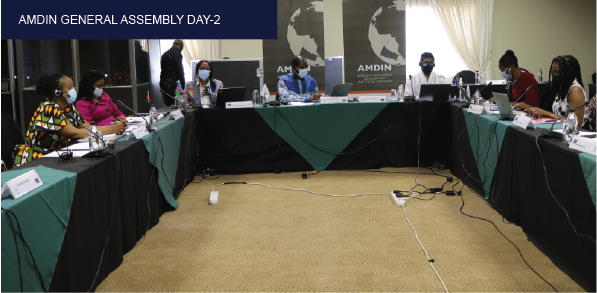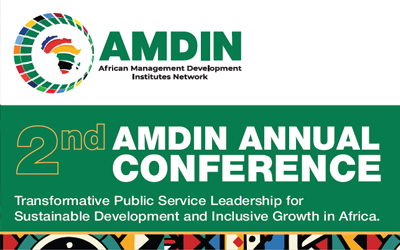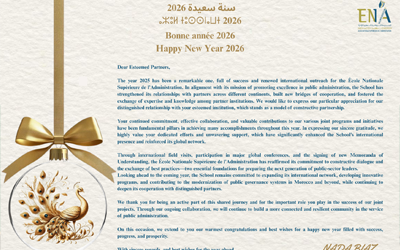Article by Mamphoke Mohlala
The African Management Development Institutes’ Network (AMDIN) held its hybrid General Assembly (GA) meeting on September 28-29, 2021. The purpose of the GA was to discuss and evaluate the activities of the previous years, plan for future programmes. The members who attended the GA were Director-Generals/ Heads of Institutes from different Management Development Institutes (MDIs). They represented all the five geographical regions of the African Union. The Southern African region met in Pretoria where the main proceedings took place, the West Africa region met in Accra, Ghana, the Eastern Africa region met in Kigali and Central and North Africa met virtual. The highlights of the GA were the elections of the new Executive Committee that will serve for the next two years and the launch of the new book on Public Administration Challenges – Case studies from Africa. The meeting was delivered in the English, French and Portuguese languages.
The meeting received messages of support from namely, the African Union represented by Mr Issaka Garba Abdou, the Acting Director: Governance and Conflict prevention, Department of Political Affairs, Peace and Security, Dr George Kojo Scott, Secretary General of the African Association for Public Administration and Management (AAPAM) ,Prof Alexander Yonly , President: West Africa Management Development Institute Network (WAMDEVIN) and Mr Raul De Luzenberger, Minister Deputy Head of delegation European Union in South Africa.
The Keynote address and the official opening was delivered by the Honourable Minister of Public Service from the Kingdom of Lesotho, Mr Keketso Sello. To quote a few words from the Minister’s opening remarks he said “’AMDIN is playing a pivotal role in supporting MDI’s in the development of Human Capital, there are emerging challenges facing the Institutes, brought about by COVID-19 pandemic which has accelerated the 4th Industrial revolution. This challenge requires a paradigm shift in the way MDI’s have been doing business, a shift from the conventional face to face mode of teaching to hybrid or blended where most training has to be conducted virtually. A lot of support is therefore required for the Institutes to move towards virtual learning which has its own challenges mostly aligned to internet connectivity and up to date IT Infrastructure, which call for a need to bridge the digital divide for equitable access.

It would be remiss of me if I cannot commend AMDIN for the milestones achieved thus far particularly the development of Africa Public Service Charter programme which advocates for a culture of accountability and integrity, professionalism and ethics in the Public Service and administration; and the Khaedu programme which focuses on capacity development for public officers and the African Governance programme.”
These words from the Minister resonated with most members as most of them could relate to the situation described by the Minister above. After the official opening, the Secretary-General, Mr Busani Ngcaweni presented a report on the governance issues of AMDIN and the achievements to date. He was followed by the Vice Presidents of the five regions who also presented on the outcome of the meetings held by each region on their role and what needs to be done to improve the situations of the MDIs they represent.
Day 2 of the General Assembly started with a presentation from the Chief Financial Officer, Ms Mkwanazi who is responsible for the AMDIN finances. Members were urged to continue to pay for their membership fee to enable the network to continue implementing its programmes as the funding from the EU is coming to an end in December 2021. The meeting unanimously adopted the resolution to reduce the membership fee to $1000 per annum. The members were informed that the good financial health of AMDIN was dependent on their continued contribution to the membership fees. An update was also presented on the African Governance programme by Ms Faith Nyaka. She informed the meeting that the final evaluation of the programme will take place in November 2021. This evaluation session will involve all the MDIs that took part in initial phases of the programme. Lastly, Prof Thean Potgieter presented on the future sustainability of the Journal. The meeting thanked all the presenters for the good work done in all these activities. The day ended with the elections of the Executive Committee. The Committee is led by Prof Ludeki Chweya from the Kenya School of Government.

The day ended with the elections of the Executive Committee. The Committee is led by Prof Ludeki Chweya from the Kenya School of Government.
Prof Chweya expressed his profound gratitude to the membership of the AMDIN GA for the confidence they have expressed in electing the new leadership to serve AMDIN for the next two years. He also took an opportunity to congratulate the outgoing Executive Committee led by Mr Chilundo as the President and Mr Busani Ngcaweni as the Secretary-General for the successful stewardship of AMDIN over the past years. AMDIN could not have performed as well as its have done, if it was not for the support of the dedicated partners like the European Union. The EU played a critical role in the continued support in capacity building initiatives and the furtherance of the objectives of AMDIN.



